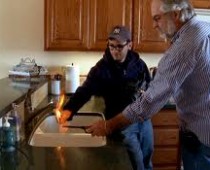Shale gas drillers injected diesel fuel into the ground
http://www.examiner.com/energy-in-philadelphia/shale-gas-drillers-injected-diesel-fuel-into-the-ground-1
August 18th, 2010
Shale gas drillers injected diesel fuel into the ground
Tap water catching fire due to natural gas migration from hydraulic fracking operations.
Photo: Source: Gasland
In February of this year, the House Energy and Commerce Committee revealed Halliburton and BJ Services, two oil and gas currently operating in Pennsylvania’s Marcellus Shale formation, had used diesel fuel in hydraulic fracturing operations in at least 15 states in from 2005 to 2007. The gas companies would not reveal to the committee where these injections occurred and may have broken the Safe Water Drinking Act laws.
Hydraulic drilling fracking operations inject millions of gallons of water combined with toxic chemical laden compounds to create intense high pressure to break and keep open underground shale rock formations which allows natural gas to be captured. The process is highly controversial with gas industry front groups stating the process is safe while government officials, residents in drilling areas and environmentalists are all increasingly concerned about the negative effects on drinking water supplies along with air and land damage from these other chemical pollutants which result from shale gas drilling operations.
Benzene and toulene, both toxic substances and known cancer causing agents in low concentrations are found in fracking solution compounds.
The Marcellus Shale formation covers almost two thirds of the state of Pennsylvania including more than 36% of the Delaware River Basin which supplies drinking water to millions in the greater Philadelphia area. There are more than 3700 Pennsylvania shale gas drilling permits currently issued to oil and gas companies, mostly to out of state firms. Shale gas formations are also found in Texas and Colorado along with other parts of the country.
The three oil and gas companies heavily involved in chemical fracking named in the committee’s February disclosure were Halliburton, BJ Services and Schlumberger. These companies are currently drilling in Pennsylvania and members of the gas industry front group, the Marcellus Shale Coalition. The federal committee’s disclosures that these companies injected diesel fuel into the ground as part of their fracking operations appears to directly contradict ongoing gas industry front group claims such chemical solutions are harmless to the environment and drinking water supplies. Halliburton and BJ Services had signed a federal non-dissent decree back in 2003 that would no longer inject diesel fuel into the ground during their drilling operations.
More than 25 major environmental groups have written to the federal Environmental Protection Agency and the U.S. House of Representatives requesting the government determine whether these companies violated the federal Safe Drinking Water Act (SDWA).
“Oil washing up on our shores is not the only threat America currently faces from the oil and gas industry,” said Lynn Senick with Northeast Pennsylvania Gas Action. “Currently, there is not a system in place to make sure that toxic diesel fuel is not polluting our drinking water sources.”
In April of this year, Kenny Watt of Houston, Texas based BJ Services, vice president of the company’s pressure injection services stated, “We have taken an extremely proactive approach in the Marcellus Shale play, with the long-term objective of becoming the largest provider of casing and tubing running services in the region,’. This was the same month, oil giant Baker Hughes of Houston, Texas acquired BJ Services.
The revelations by the federal government that these companies had used diesel fuel as part of their underground fracking solutions comes at same time the gas industry steadfastly refuses to release the details of their fracking solutions claiming they are trade secrets.
Oil and Gas Company Penneco, owned by the Jacobs family of Pittsburgh, is very strongly opposed to any increased regulation of industry operations. The company stated, “We are concerned that bureaucratic machinations have caused the EPA to hypothesize a problem and that the EPA is now seeking to justify a solution to a nonexistent problem.”
To learn more about Penneco, go to: http://www.penneco.com
To learn more about the federal Environmental Protection Agency, go to: http://www.epa.gov/
Disclaimer: The writer holds no stocks or has any financial arrangements with any of the companies named in this article.

